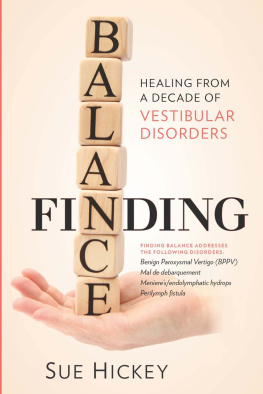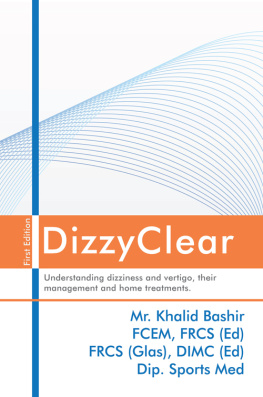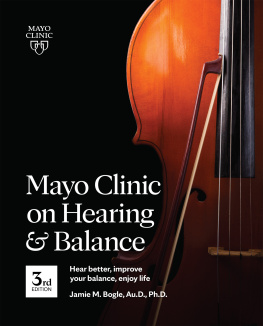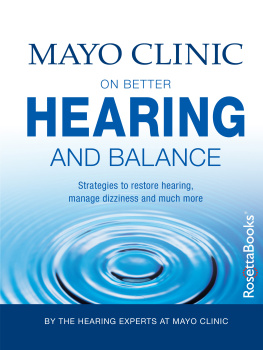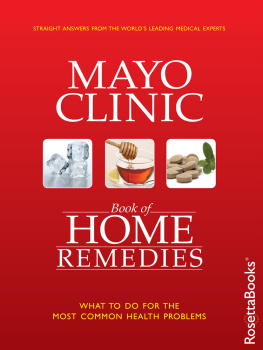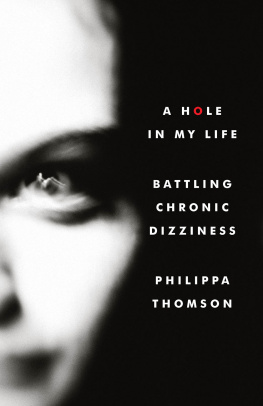Contents
Guide
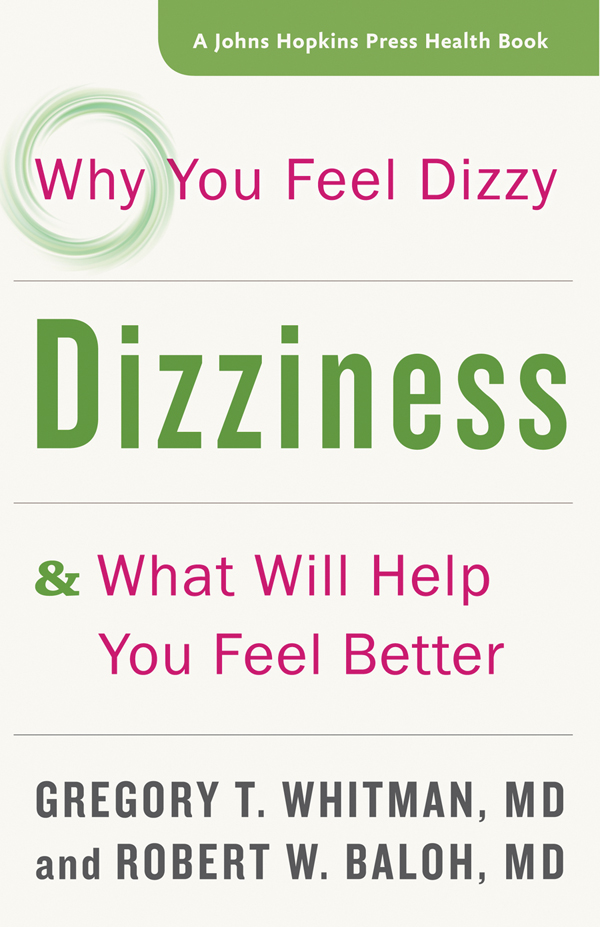
Dizziness
A Johns Hopkins Press Health Book
Dizziness

Why You Feel Dizzy
and
What Will Help You Feel Better
GREGORY T. WHITMAN, MD and ROBERT W. BALOH, MD
Johns Hopkins University Press Baltimore
Note to the Reader: This book is not meant to substitute for medical care of people with dizziness, and treatment should not be based solely on its contents. Instead, treatment must be developed in a dialogue between the individual and his or her physician. Our book has been written to help with that dialogue.
Drug dosage : The authors and publisher have made reasonable efforts to determine that the selection of drugs discussed in this text conform to the practices of the general medical community. The medications described do not necessarily have specific approval by the US Food and Drug Administration for use in the diseases for which they are recommended. In view of ongoing research, changes in governmental regulation, and the constant flow of information relating to drug therapy and drug reactions, the reader is urged to check the package insert of each drug for any change in indications and dosage and for warnings and precautions. This is particularly important when the recommended agent is a new and/or infrequently used drug.
2016 Johns Hopkins University Press
All rights reserved. Published 2016
Printed in the United States of America on acid-free paper
9 8 7 6 5 4 3 2 1
Johns Hopkins University Press
2715 North Charles Street
Baltimore, Maryland 21218-4363
www.press.jhu.edu
Library of Congress Cataloging-in-Publication Data
Names: Whitman, Gregory T., 1966 author. | Baloh, Robert W. (Robert William), 1942 author.
Title: Dizziness : why you feel dizzy and what will help you feel better / Gregory T. Whitman, MD, and Robert W. Baloh, MD.
Description: Baltimore : Johns Hopkins University Press, 2016. | Series: A Johns Hopkins Press health book | Includes bibliographical references and index.
Identifiers: LCCN 2016002111 | ISBN 9781421420899 (hardback) | ISBN 9781421420905 (paperback) | ISBN 9781421420912 (electronic)
Subjects: LCSH: Dizziness. | Vertigo. | Vestibular apparatusDiseases. | BISAC: HEALTH & FITNESS / General. | MEDICAL / Neurology. | HEALTH & FITNESS / Diseases / General.
Classification: LCC RB150.V4 W45 2016 | DDC 616.8/41dc23
LC record available at https://lccn.loc.gov/2016002111
A catalog record for this book is available from the British Library.
Special discounts are available for bulk purchases of this book. For more information, please contact Special Sales at 410-516-6936 or specialsales@press.jhu.edu.
Johns Hopkins University Press uses environmentally friendly book materials, including recycled text paper that is composed of at least 30 percent post-consumer waste, whenever possible.
To our wives, Sally and Grace, who provided the inspiration, and to our dizzy patientsyou have taught us more than any book
Contents
Preface
You should read this book if you are dizzy, if you are lightheaded, if your world seems to move when it shouldnt, or if you are off balance and have fallen. The authors of this book specialize in taking care of people with dizziness and imbalance and they understand how distressing these symptoms can be. (Words appearing in boldface type are defined in the glossary at the back of the book.)
People with dizziness tell us we are their last hope. We believe thats an overstatement, but it captures the way many dizzy people feel. The good news is there are always things we can do for people with dizziness. This untapped therapeutic potential is what gets us into the clinic on days we see patients. Our clinics and those like them go by a variety of names. Sometimes our specialty is called otoneurology (a term that is used a lot in Boston) or neuro-otology (a hyphenated term that has been sanctioned by the American Academy of Neurology), or neurotology (used at the University of California at Los Angeles, though not without slight confusion because there is also a surgical specialty called neurotology, which is a branch of otolaryngology). Whatever you call it, our specialty involves making a diagnosis and prescribing treatment for people with dizziness and imbalance.
Most people with dizziness will be treated first by a generalist, such as a doctor trained in internal medicine, family practice, or emergency medicine. In many cases, the generalists approaches work well. But many generalists go only so far with dizziness. They have a few reasonable responses to dizziness in their toolbox. When these do not work, many refer dizzy people to clinics like ours, at least in regions of the country where such clinics exist. We hope this book will fill a need for people who do not have access to a dizziness specialist and enhance care for those who do have such access.
In this book, we start from the assumption that the reader would like to know how the best doctors make a diagnosis. We base this assumption on our experience with many thousands of patients. Many people with dizziness have seen multiple doctors, and none of these doctors has been able to make a clear diagnosis. The reader may have nothing to go on, other than his or her symptoms. Therefore, we focus on symptoms. We have divided the book into parts, each of which addresses a particular class of symptoms. Within each such part, we discuss specific diseases: how they are defined and diagnosed, how doctors and scientists understand the disease, and the best approaches to treatment. Childhood dizziness could be the focus of a whole book and as such is beyond the scope of the present volume, though many of our comments are applicable to children as well as adults.
How did we decide which diseases to include? We admit that this was a challenge. We apologize in advance to those for whom we have omitted something important. An essential problem is that almost every disease can cause dizziness. We must always therefore be on the alert for a serious disease presenting as dizziness. Some examples are stroke, transient ischemic attacks (TIAs), multiple sclerosis, and brain tumors. The doctor who cares for people with dizziness must have a solid grasp of general medicine. Despite this array of possibilities, though, the vast majority of people who come to our dizziness clinics have something not so serious, though even a short-lived problem can make the affected person feel very sick for a period of time.
Medical students are taught to concentrate on the common causes of symptoms. The focus on the common is encapsulated by the old saying that when one hears hoofbeats, it is best to think of horses, not of zebras. We will tell you about the most common problems experienced by our patients. In addition, we will identify so-called red flagssymptoms that suggest the possibility that something more serious is going on. We also give the reader some ideas about how we recognize that we are dealing with a less common disordera zebra and not a horse.
With respect to the common, one might ask: why focus on our own clinics at UCLA- and Harvard-affiliated hospitals? Isnt that asking for bias? Do our clinics reflect the experience of people in general? We thought about this. There are two answers. We are familiar with dizziness specialty clinics across the United States and overseas. In general, dizziness clinics that are staffed by neurologists are remarkably similar. The mixture of diagnoses does not differ drastically from one to the next. If you are seen by a neurology clinic that specializes in dizziness, you can pretty much bet that the other people in the waiting room, and quite possibly you, will experience issues discussed in this book. The second reason for our choice of diseases is that these are the ones we know best. The problems described in this book are problems we have seen hundreds, or in some cases thousands, of times. We feel we can most authoritatively comment on those disorders with which we have the greatest experience. Considering how common dizziness is in general, we think that by simply telling stories about what we have personally seen on the front lines, we may be able to do some good.



